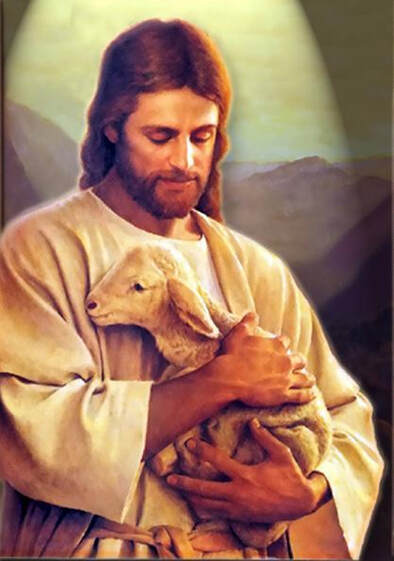John 1:19-34
Lesson 165
Lesson 165
Read both the "King James Bible" and the "New Living Translation."
In this lesson:
John the Baptist and the Lamb of God.
John the Baptist and the Lamb of God.
Jesus, the Lamb of God.
By Del Parsons.
By Del Parsons.
Study Tip:
Repetition is a tool writers use to emphasize key points. Whenever you see themes repeated in the Bible, it is a clue that God considers them important. Hover over these passages a little longer to fully grasp their meaning.
Repetition is a tool writers use to emphasize key points. Whenever you see themes repeated in the Bible, it is a clue that God considers them important. Hover over these passages a little longer to fully grasp their meaning.
Who were the -
Levites -
A Jewish religious order from the tribe of Levi (sons of Levi). From the age of twenty-five until fifty, male Levites served as assistants to the Temple priests (Numbers 3:5-9; 8:14-15;8:19; 8:24-25; Deuteronomy 18:5-7). They were everything from doorkeepers and musicians to "officers and judges." They read the Mosaic Law to the people during the Feast of Tabernacles (Deuteronomy 31:9-11) and taught Judaism (Deuteronomy 33:10; 2 Chronicles 17:8-9; Ezekiel 44:23). Levites were also responsible for cleaning and guarding the Temple, preparing the showbread, helping the priest sacrifice animals, and examining lepers, among other chores (1 Chronicles 23:3-5; 23:24-32). To prepare for their duties, Levites cleansed themselves and their clothes, shaved all their body hair, and made an animal sacrifice (Numbers 8:6-8). As compensation for their service, they received tithes (Numbers 18:21). From this tithe, they turned over ten percent to the priests (Numbers 18:26).
Pharisees' -
One of four Jewish religious sects, along with the Sadducees, Zealots, and Essenes. Pharisee is a Hebrew word meaning the separated ones." They were a legalistic party of religious leaders who avoided anything non-Jewish and studied and lived by the Torah (the Mosaic Law). They strictly, but often hypocritically, kept the Law of Moses and the "tradition of the elders" (Matthew 15:2). They were a dominant force in Jewish society, and all religious ceremonies, prayers, and sacrifices were performed according to their decrees. The Pharisees believed in God, the authority of the
Scriptures, the resurrection of the dead (Daniel 12:2), angels, and spirits (Acts 23:8), but they placed their own religious rules above God's. They continually added more and more of their own burdensome dictates on their followers to the point where true faith was lost. They anticipated the Messiah's arrival but expected him to be a great military/political
leader. The Pharisees were good at spinning the truth and finding fault in others and were so caught up in following the minute details of Jewish law that when Christ arrived; they didn't recognize Him. They refused to accept Jesus as the Messiah even though they knew He performed "many miracles" (John 11:47) and even witnessed some firsthand (Matthew 12:9-14; 21:14-15; Mark 3:1-6; Luke 5:24-26;6:6-11; Luke 14:2-4). They fasted twice a week (Luke 18:10-12) and considered themselves more devout than other Jews. Yet, few Pharisees were truly religious, and Jesus called them hypocrites on many occasions (Matthew 15:7-8; 22:18; 23:23-35; Luke 12:1). Their jealousy, pride, and anger towards Jesus turned to hatred, and their hatred led them to call for the crucifixion of the very Messiah they had been waiting
on. To rid themselves of Jesus, the anti-Roman Pharisees even "took counsel with their bitter foes and pro-Roman Herodians" (Mark 3:6). In Jesus' time, there were approximately six thousand Pharisees' in Palestine.
Levites -
A Jewish religious order from the tribe of Levi (sons of Levi). From the age of twenty-five until fifty, male Levites served as assistants to the Temple priests (Numbers 3:5-9; 8:14-15;8:19; 8:24-25; Deuteronomy 18:5-7). They were everything from doorkeepers and musicians to "officers and judges." They read the Mosaic Law to the people during the Feast of Tabernacles (Deuteronomy 31:9-11) and taught Judaism (Deuteronomy 33:10; 2 Chronicles 17:8-9; Ezekiel 44:23). Levites were also responsible for cleaning and guarding the Temple, preparing the showbread, helping the priest sacrifice animals, and examining lepers, among other chores (1 Chronicles 23:3-5; 23:24-32). To prepare for their duties, Levites cleansed themselves and their clothes, shaved all their body hair, and made an animal sacrifice (Numbers 8:6-8). As compensation for their service, they received tithes (Numbers 18:21). From this tithe, they turned over ten percent to the priests (Numbers 18:26).
Pharisees' -
One of four Jewish religious sects, along with the Sadducees, Zealots, and Essenes. Pharisee is a Hebrew word meaning the separated ones." They were a legalistic party of religious leaders who avoided anything non-Jewish and studied and lived by the Torah (the Mosaic Law). They strictly, but often hypocritically, kept the Law of Moses and the "tradition of the elders" (Matthew 15:2). They were a dominant force in Jewish society, and all religious ceremonies, prayers, and sacrifices were performed according to their decrees. The Pharisees believed in God, the authority of the
Scriptures, the resurrection of the dead (Daniel 12:2), angels, and spirits (Acts 23:8), but they placed their own religious rules above God's. They continually added more and more of their own burdensome dictates on their followers to the point where true faith was lost. They anticipated the Messiah's arrival but expected him to be a great military/political
leader. The Pharisees were good at spinning the truth and finding fault in others and were so caught up in following the minute details of Jewish law that when Christ arrived; they didn't recognize Him. They refused to accept Jesus as the Messiah even though they knew He performed "many miracles" (John 11:47) and even witnessed some firsthand (Matthew 12:9-14; 21:14-15; Mark 3:1-6; Luke 5:24-26;6:6-11; Luke 14:2-4). They fasted twice a week (Luke 18:10-12) and considered themselves more devout than other Jews. Yet, few Pharisees were truly religious, and Jesus called them hypocrites on many occasions (Matthew 15:7-8; 22:18; 23:23-35; Luke 12:1). Their jealousy, pride, and anger towards Jesus turned to hatred, and their hatred led them to call for the crucifixion of the very Messiah they had been waiting
on. To rid themselves of Jesus, the anti-Roman Pharisees even "took counsel with their bitter foes and pro-Roman Herodians" (Mark 3:6). In Jesus' time, there were approximately six thousand Pharisees' in Palestine.





